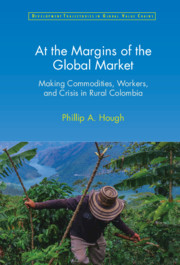Book contents
- At the Margins of the Global Market
- Development Trajectories in Global Value Chains
- At the Margins of the Global Market
- Copyright page
- Contents
- Figures and Tables
- Acknowledgments
- Introduction
- 1 Toward a Sociology of Labor and Development at the Margins of the Market
- Case Study #1 The Rise and Fall of Hegemony in the Coffee Regime of Viejo Caldas
- Case Study #2 Despotism and Crisis in the Banana Regime of Urabá
- Case Study #3 The Rise and Fall of FARC Counter-Hegemony in the Coca Regime of Caquetá
- Conclusion
- Appendix
- References
- Index
Conclusion
Toward Labor-Friendly Development in an Era of World-Systemic Crisis
Published online by Cambridge University Press: 07 January 2022
- At the Margins of the Global Market
- Development Trajectories in Global Value Chains
- At the Margins of the Global Market
- Copyright page
- Contents
- Figures and Tables
- Acknowledgments
- Introduction
- 1 Toward a Sociology of Labor and Development at the Margins of the Market
- Case Study #1 The Rise and Fall of Hegemony in the Coffee Regime of Viejo Caldas
- Case Study #2 Despotism and Crisis in the Banana Regime of Urabá
- Case Study #3 The Rise and Fall of FARC Counter-Hegemony in the Coca Regime of Caquetá
- Conclusion
- Appendix
- References
- Index
Summary
This concluding chapter revisits the main questions driving the book, including how to explain Colombia’s contradictory development trajectory and the stark variation that has arisen across its coffee, banana, and coca labor regimes. It begins by reiterating the need for a labor regimes framework that is attuned to the crisis tendencies of labor regimes that exist at the margins of the global market. It then addresses the question of why we saw such stark variation across rural Colombia during the postwar developmental decades, showing how the establishment of hegemony in Viejo Caldas and despotism in Urabá and the Caguán resulted from a complex interaction of factors operating at the local, national, world-systemic, and interregional scales of analysis. Next, it addresses the temporal question of why these distinct regimes converged toward crises of labor control in the 1980s and 1990s, showing how this process also resulted from a contingent and complex range of factors operating across various scales of analysis. Finally, it summarizes the current conjuncture of crises in Colombia, emphasizing how prior efforts to resolve these crises through economic upgrading has been closed off due to the demise of US world hegemony, leaving de-proletarianization as a more viable solution.
- Type
- Chapter
- Information
- At the Margins of the Global MarketMaking Commodities, Workers, and Crisis in Rural Colombia, pp. 301 - 322Publisher: Cambridge University PressPrint publication year: 2022

